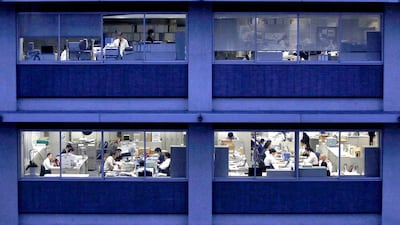If you didn’t feel like going into work today, your instincts might just have been right. According to recent research, the office could actually be bad for our heath.
The study was undertaken by the Harvard T H Chan School of Public Health’s Centre for Health and the Global Environment, State University of New York Upstate Medical University and Syracuse University. It showed employees’ cognitive scores suffered when exposed to levels of CO2, pollutants and ventilation in conventional buildings, compared to when the levels were lowered to reflect those in greener buildings. On average, cognitive scores were 61 per cent higher when the indoor environment was simulated to reflect green rated buildings, and 101 per cent higher when the indoor environment was like that of a green+ rated buildings.
“Office workers had significantly improved cognitive function scores when working in green and green+ environments compared to a conventional one,” concludes the study, which appeared in Environmental Health Perspectives.
Matthew Mitchell, an air quality scientist who works in Abu Dhabi for Aecom, an environmental consultancy, is not surprised by the findings.
“The influence of having inadequate ventilation in buildings has been quite well established [in previous studies],” he says.
And while the levels of CO2 in conventional offices are a long way from inducing hypercapnia, a high level of carbon dioxide in the blood, Mr Mitchell says the research certainly shows prolonged exposure to a higher level of CO2 decreases our ability to perform at our best.
Dr Stefane Mostefa Kabene of the School of Environment and Health Sciences at Canadian University Dubai, is not so sure. He says there are too many variables involved in a work environment, such as stress, to conclude CO2 levels are responsible for the change in cognitive scores.
He concedes that working in a poorly ventilated area could cause problems.
As Mr Mitchell points out, spend an hour in a traffic jam with the AC on, and you will draw air in right from someone else’s exhaust pipe.
Q&A
Matthew Mitchell, an air quality scientist at Aecom in Abu Dhabi, explains to Gillian Duncan how working in an air-conditioned office affects our health:
Are we subjected to more CO2 in the UAE because of the AC compared to other parts of the world where you can open the windows?
We are more subjected to recycled air. So to have air conditioning working effectively you go through a process of cooling the same air over and over again to make it more efficient. Obviously if you tried to cool all of the air that came in you would require huge volumes of energy. So it is more recirculation with an AC unit.
What does that mean for our health? Is it all bad news?
There can be some positive sides to this. In a very urbanised area, especially areas close to road pollution, there will be a higher level of CO2 and also things like nitrous oxide, carbon monoxide and particulates, so in a way these centralised systems can reduce our exposure to those pollutants if the unit is lined appropriately.
How can employers help staff stay sharp in the office?
Plants have psychological benefits and they are also a natural sync of carbon dioxide in the office. But I imagine in an office environment you would have to create a jungle to try and get the amount of CO2 absorption [required]. There is probably a good argument for open-plan offices to allow air to circulate better. Lots and lots of small offices mean people are contained within small environments and more likely to have the same recycled air again.
business@thenational.ae
Follow The National's Business section on Twitter


